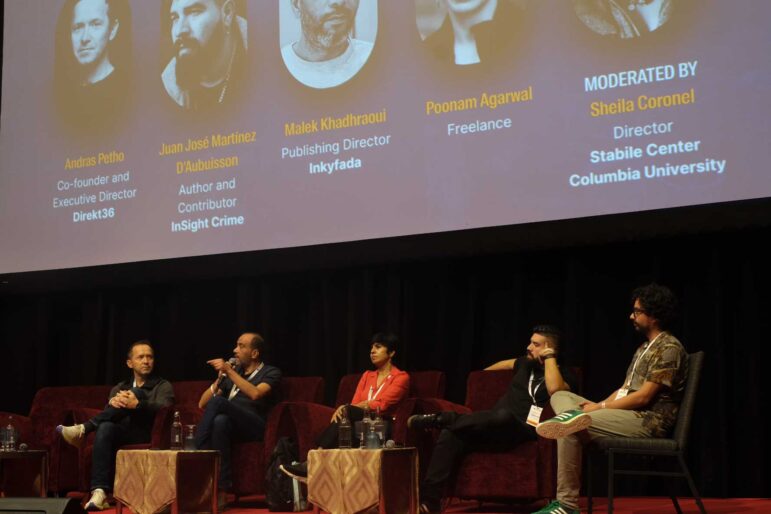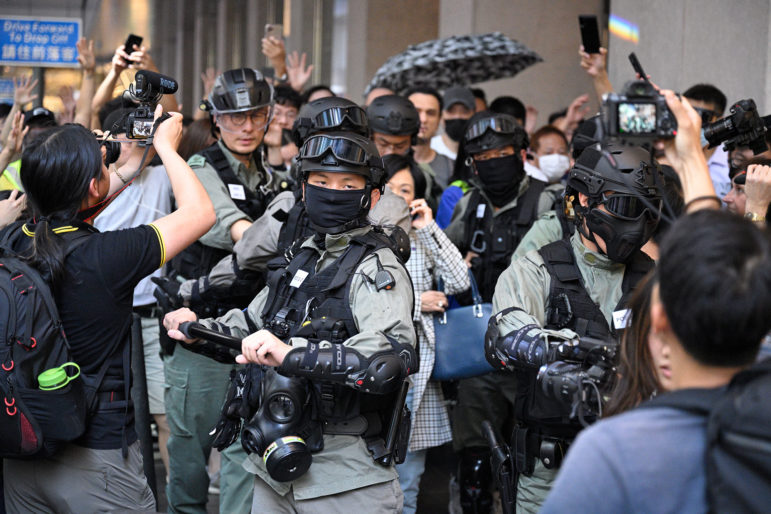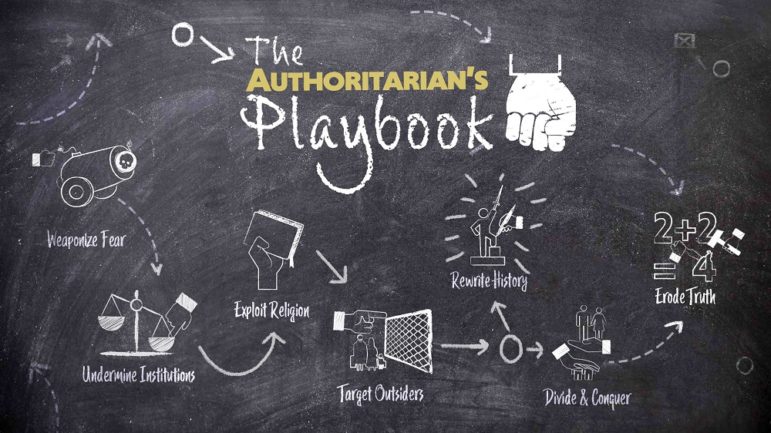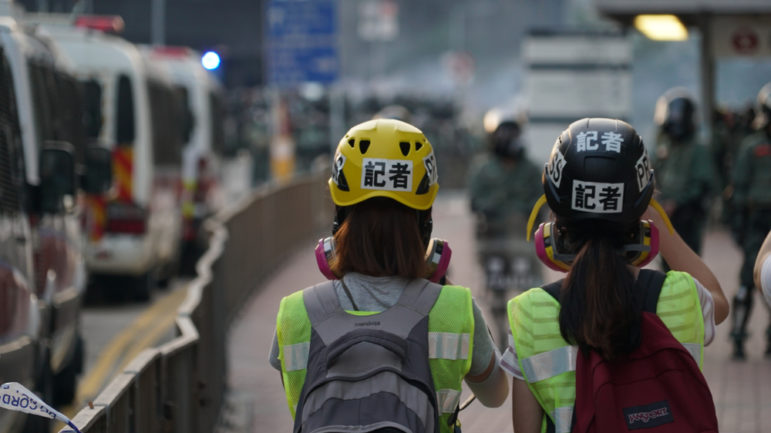

Speakers at the GIJC25 panel on Investigating Amidst a Decline in Democracy. Image: Alyaa Abdul Aziz Alhadjri for GIJN
5 Tips on How to (More) Safely Investigate in Authoritarian States
Read this article in
With a growing number of countries around the world shifting towards authoritarianism, freedom of the press is increasingly under attack — but there are ways to keep reporting safely, according to seasoned reporters and editors.
From Hungary and Tunisia, to India and El Salvador, democracy has backslid in many countries in the past decade. Journalists face increasing attacks as a result, including criminal lawsuits, harassment by tax authorities, and smear campaigns. At the 14th Global Investigative Journalism Conference (GIJC25), four journalists shared the strategies they deploy to fight back in a session entitled “The Authoritarian Shift: Investigating Amidst a Decline in Democracy.”
“It’s a cat and mouse game where journalists are constantly trying to outsmart the dictatorship and defend themselves from the dictatorship,” said Salvadoran author and anthropologist Juan José Martínez D’Aubuisson, who is a contributor to media platform InSight Crime. “We don’t always win this game, but we have to keep playing it.”
Here are five tips from GIJC25 on how to keep investigating your stories in countries where democracy is under threat — and, hopefully, stay out of jail.
1. Shield Yourself with Evidence
An obvious recommendation that’s worth repeating: back every claim you make with documents and data, and fact check everything, the panelists said. This will help you in any court proceedings and protect your reputation.
This advice assumes that where you are reporting or publishing from has a functioning judicial system — but even when that’s not the case, publishing hard-hitting investigations with indisputable evidence will protect you.
“We fight back by exposing the system based on facts,” said Malek Khadhraoui, publishing director of Tunisian newsroom Inkyfada.
2. Protect Yourself and Your Sources
Above all, it’s crucial to protect yourself and your sources. There’s no one way to do that in a uniform way — you have to adjust to each local context, said Martínez D’Aubuisson. Think about every source individually and change your strategy accordingly. Be aware that surveillance tools, such as Pegasus spyware, might compromise your phone and be careful what you communicate, even via secure messaging apps.
When it comes to protecting yourself, reporters should be aware that attacks will come from different sides. Tax audits to harass journalists are common in authoritarian regimes as well as those in which democracy is backsliding, as are administrative obstacles and smear campaigns, said the panelists.
In some cases, it simply won’t be possible to keep doing investigative journalism from within the country without risking imprisonment or even physical attacks. If necessary, consider working from exile to avoid imprisonment or physical threats, said Martínez D’Aubuisson.
“Ninety percent of journalists [reporting on] El Salvador are in exile — including me,” he said.
3. Counter Disinformation Strategically
Around the globe, misinformation campaigns are rampant. In some contexts, it can be helpful to track the networks behind coordinated misinformation campaigns, said Inkyfada’s Khadhraoui. This can expose operational patterns and potential links to a regime, he said.
In previous investigations into misinformation campaigns, Inkyfada’s team had scraped web pages from social media accounts that appeared to be identical — and then tracked their ownership, created spreadsheets, and monitored new pages and connections to demonstrate coordinated misinformation campaigns at work.
“The better solution is to fight back, to demonstrate, and to investigate,” he said.
In other cases, it’s simply impossible to fight back directly against disinformation campaigns, said Andras Petho, co-founder and executive director of independent news outlet Direkt36. In Hungary, for example, one Russian misinformation campaign was identical with an official government line, which made it extremely difficult to counter, he said. The Direkt36 team focuses its efforts on putting out accurate information rather than reporting that directly counters misinformation.
“When your water supply is contaminated and it’s not you who is controlling the pipes, you cannot really take the contamination out of the water,” said Petho. “What you can do is push more clean water into the system and… mitigate the problem a little bit.”
Sometimes journalists, especially investigative ones, are direct targets of misinformation and smear campaigns.
In those cases, said freelance investigative journalist Poonam Agarwal, who has extensive experience covering elections, corruption, and systemic abuse, the best strategy is to simply not take the bait. Troll armies seek responses, so you should outright refuse to engage and wait until they select their new target, she added. While harassment can last for several days, engaging with your trolls will only prolong their campaign.
“They want the journalist’s attention,” she warned. “Let’s not forget that they’ve been paid, so they are doing their work. Less interaction will give you sanity.”
4. Diversify Your Financial Sources
One of the easiest ways for governments to put pressure on newsrooms is to cut or threaten their financial resources, revenue streams, or sustainability. In Hungary, for example, sitting prime minister Viktor Orbán has captured traditional media, said Direkt36’s Petho.
Try to be as independent as possible from advertising revenue or other sources that could be restricted by the government. In the case of Direkt36, a membership model has proven successful with more than 75% of the outlet’s income coming from its members, according to Petho.
Inkyfada’s Khadhraoui echoed this assessment. To ease pressure on the newsroom, he and his colleagues created a company outside of Tunisia that can support journalists working in exile and gather financial support from the Tunisian diaspora.
5. Collaborate, Collaborate, Collaborate
International collaboration can be time-consuming — but it is definitely worth it, explained Khadhraoui. International newsrooms can assist when you’re under threat and help spread the risk. If it’s too risky to publish in your own country, you should also consider offering the story to partners abroad. “The most important [thing is] that the story gets out,” he said.
To protect yourself and your work, it’s crucial to maintain relationships with other journalists and keep up with the network. “They can save you one day when you need them,” he said.









